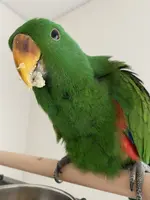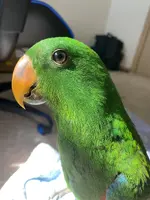- May 23, 2022
- 57
- 108
- Parrots
- Eclectus, conure, and cockatiel
hello,
I adopted my 12 week-old baby male Eclectus two weeks ago. Before his arrival, the breeder contacted me 2 days prior to his adoption date with concerns about his behavior. She said that ever since his brother got adopted, his behavior has become aggressive. I believed this story because I know birds can get depressed when a bird they know leaves suddenly. I asked her to send videos of his behavior and he didn't seem to be biting so I still accepted him. (yes ik this was my first mistake even choosing this breeder but I believe all domesticated birds deserve a home)
When the adoption day came, I went to pick him up and immediately saw how fearful and aggressive he was. Even the shadow of hands on the outside of the carrier made him lunge. Any hands that he could see he would try to lunge at and bite. I would wait for him to calm down when he would try to bite my hand in the carrier and reinforced his calm behavior by removing my hand. When I took him home (since he is flighted and would like to keep it this way) I opened his carrier in my bathroom (a small area for him to come out and not freak out or fly away/crash) and let him come out on his own. I offered him some fresh food & water. After about an hour of sitting on the floor in front of the carrier, he flew out and landed on my leg. I tried to pick him up but he immediately went to bite and lunge. Since it had been 4 months since I handled a bird (my conure passed away then) instinct took over and I pulled away from his bite although I shouldn't have. Then I sat there for a while, hands behind my back or he would have his mouth open to bite the entire time. This is when I realized this guy would probably take months to a year of training. It's really sad seeing hand aggressive birds at such a young age. I thought about contacting the breeder because as more time went by the less confident I got with this bird. But because of how aggressive he is towards JUST HANDS at this age (I can put my face close and even give him kisses as long as my hands aren't there) it is a bit concerning to send him back to where he came from because I feel like I was not given the full story. So I decided to keep him again.
I've been working with him every day and doing things like eating together, target training, and power pause training (showing him my hand, rewarding him when he shows signs of disinterest in my hand, and gradually decreasing distance) It doesn't seem to be working though. I also don't want to TRAIN him to accept touching (unless it's wings, feet, etc. for vet those I would want to train) I want him to be OK with touching without thinking it's a trick. There were so many things I was planning to train like recall, free flight, stationary training, and taking him on errands to desensitize since all my birds have enjoyed being shoulder birds (basically going everywhere with me). He also doesn't WANT to be with me. If I wear gloves and try to sit with him on my hand (he steps up on gloves occasionally) he will fly back to his cage & only wants to stay there. (He has a play area on top and he goes there too) He flies around a lot which I like, and if he's hungry he will fly above me to get my attention. Other than that he does not seem like he wants to interact with me. I do understand he is just a baby (I've also tried consultants about him but they tell me things I already know and didn't add anything helpful -- a waste of money T.T) and that is why I want to start early. I also need to cut his nails, (his nails are so sharp and since he wants to stepup onto my forearm instead of my hand he's been shreding my arm) but I'm not sure if I should yet because that could set us back further in training. Do you guys think he will eventually warm up?
Any advice for my bird Yoshi would be greatly appreciated.
Thank you for taking your time to read 💕
I adopted my 12 week-old baby male Eclectus two weeks ago. Before his arrival, the breeder contacted me 2 days prior to his adoption date with concerns about his behavior. She said that ever since his brother got adopted, his behavior has become aggressive. I believed this story because I know birds can get depressed when a bird they know leaves suddenly. I asked her to send videos of his behavior and he didn't seem to be biting so I still accepted him. (yes ik this was my first mistake even choosing this breeder but I believe all domesticated birds deserve a home)
When the adoption day came, I went to pick him up and immediately saw how fearful and aggressive he was. Even the shadow of hands on the outside of the carrier made him lunge. Any hands that he could see he would try to lunge at and bite. I would wait for him to calm down when he would try to bite my hand in the carrier and reinforced his calm behavior by removing my hand. When I took him home (since he is flighted and would like to keep it this way) I opened his carrier in my bathroom (a small area for him to come out and not freak out or fly away/crash) and let him come out on his own. I offered him some fresh food & water. After about an hour of sitting on the floor in front of the carrier, he flew out and landed on my leg. I tried to pick him up but he immediately went to bite and lunge. Since it had been 4 months since I handled a bird (my conure passed away then) instinct took over and I pulled away from his bite although I shouldn't have. Then I sat there for a while, hands behind my back or he would have his mouth open to bite the entire time. This is when I realized this guy would probably take months to a year of training. It's really sad seeing hand aggressive birds at such a young age. I thought about contacting the breeder because as more time went by the less confident I got with this bird. But because of how aggressive he is towards JUST HANDS at this age (I can put my face close and even give him kisses as long as my hands aren't there) it is a bit concerning to send him back to where he came from because I feel like I was not given the full story. So I decided to keep him again.
I've been working with him every day and doing things like eating together, target training, and power pause training (showing him my hand, rewarding him when he shows signs of disinterest in my hand, and gradually decreasing distance) It doesn't seem to be working though. I also don't want to TRAIN him to accept touching (unless it's wings, feet, etc. for vet those I would want to train) I want him to be OK with touching without thinking it's a trick. There were so many things I was planning to train like recall, free flight, stationary training, and taking him on errands to desensitize since all my birds have enjoyed being shoulder birds (basically going everywhere with me). He also doesn't WANT to be with me. If I wear gloves and try to sit with him on my hand (he steps up on gloves occasionally) he will fly back to his cage & only wants to stay there. (He has a play area on top and he goes there too) He flies around a lot which I like, and if he's hungry he will fly above me to get my attention. Other than that he does not seem like he wants to interact with me. I do understand he is just a baby (I've also tried consultants about him but they tell me things I already know and didn't add anything helpful -- a waste of money T.T) and that is why I want to start early. I also need to cut his nails, (his nails are so sharp and since he wants to stepup onto my forearm instead of my hand he's been shreding my arm) but I'm not sure if I should yet because that could set us back further in training. Do you guys think he will eventually warm up?
Any advice for my bird Yoshi would be greatly appreciated.
Thank you for taking your time to read 💕
Attachments
Last edited:

